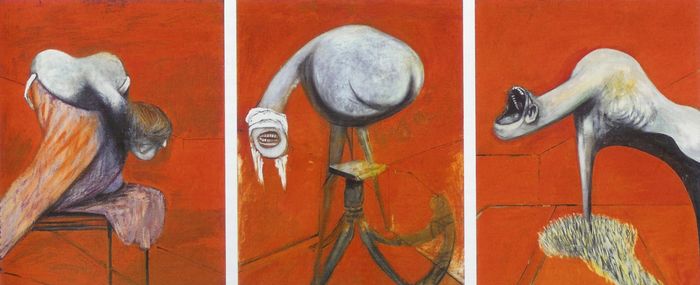‘Cat Person’ and the I who is not me
Martha French contemplates the legacy of the 2017 viral short story ‘Cat Person’ and the morality of fiction’s use of ‘biographical details’.

Content warning: this article contains discussions of sexual misconduct.
‘You own everything that happened to you. Tell your stories. If people wanted you to write warmly about them, they should have behaved better’ says Anne Lamott. ‘Could it be a wild coincidence? Or did Roupenian, a person I’d never met, somehow know about me?’ says Alexis Nowicki.
When Cat Person was published in the New Yorker in 2017, it went – as much as possible for a short story – viral. Authored by Kristen Roupenian and released at the height of the #MeToo movement, it follows college student Margot and 34 year old Robert, who engage in a murkily consensual, short-lived relationship. The majority of the story is a graphic sex scene, in which Margot is dominated by ‘a wave of revulsion’, resolving not to see Robert again and ignoring his incessant texts. When she finds herself in the same bar as him a month later, she avoids him, only for Robert to later text her ‘whore’. It was 2017’s most downloaded piece of fiction. The Washington Post praised it for articulating ‘the more ambiguous pressures surrounding sex’. It is being adapted into a film.
“And then, earlier this month, the story went viral again”
And then, earlier this month, the story went viral again. The cause? An article for Slate entitled ‘Cat Person and Me’, by writer Alexis Nowicki. Throughout the long read, Nowicki unfolds her discovery that Roupenian’s short story is in fact based – at least on the level of ‘biographical details’ – on her own relationship with an older man she calls Charles. Nowicki reels off the moments of mirroring, from her and Margot’s shared cinema job and college accommodation to Charles and Robert’s matching rabbit hats and shoulder tattoos. Eventually, Nowicki learns that Roupenian did indeed know Charles, from whom she garnered a skeletal outline of his relationship with Nowicki, forming the basis of the story’s setting and framework.
At the end of the article, Nowicki tells us that Charles died in 2020, and copies in an email to her from Roupenian, who admits ‘I was wrong not to go back and remove those biographical details, especially the name of the town. Not doing so was careless’. Unsurprisingly, the article has triggered an onslaught of twitter threads, opinion pieces, and wider concerns and discussions about the ethics of writing others into your own fiction.
I've been thinking about the Cat Person thing and people saying "Well she changed half the details so it doesn't matter"
- Arthur Chu (@arthur_affect) July 9, 2021
But -- she changed all the *intimate* details, that she didn't know, how the relationship progressed and ended
She didn't change the *public* details at all
‘I always wanted to fuck a girl with nice tits,’ says Kristen Roupenian’s Robert. ‘With me, at least, he was careful, patient, and gentle – it was the first time someone asked if they could kiss me instead of just doing it’ says Alexis Nowicki. It is hard not to sympathise. But the piece alerts us to something that Nowicki herself does not seem ready to grapple with: the two writers are not telling us the same story.
“I am not sure I share her outrage”
During the sex scenes ‘the story diverges completely from my reality’ says Alexis Nowicki. And then later, heartbreakingly, ‘Sometimes, to my own disappointment, I find myself inclined to trust Roupenian over myself’. So, if it is not the recollection of biographical details that makes Roupenian’s story, or its success, does it matter? Nowicki herself acknowledges her own experience as only a shadow of the episode Roupenian describes; moments of divergence – poached instead from Roupenian’s own experiences with online dating – have ensured Cat Person’s enduring popularity. On the other hand, while it is one thing to tell someone else’s story, isn’t there something slightly more insidious about warping it to fit one’s own agenda? Something cruel in making the relationship something slicker, something colder, something more worthy of writing about, than it was? Or is that just how fiction works?
This phase of Cat Person discourse proves it’s not enough just to avoid dating writers. No one is ever safe as long as writers live among you.
- Joe Berkowitz (@JoeBerkowitz) July 8, 2021
Most importantly, having changed all but the meet-cute of Charles and Nowicki’s relationship, can Roupenian really be said to have been writing about it? While I sympathise with Nowicki’s pain over seeing her own love life repackaged for another’s (significant) gain, I am not sure I share her outrage, nor Lamott’s ideas about ownership. Fiction is born out of cold, transformative movements, out of sharing and overhearing experiences, out of cherry-picking and amalgamating and reorienting ‘truths’ into a story that can say something new – or many new somethings – entirely. And it is Roupenian’s ability as a storyteller (illuminated by even Nowicki’s trust in her version of events) to create a story so taut and textured that means we still care about it, that means Nowicki’s article could even find publication.
“the story in the New Yorker is not Nowicki’s”
The internet remains divided. ‘Life is in the public domain, for anyone to take inspiration from or use’ says Fani Papageorgiou. ‘There’s something deeper at work here, a violation of intimacy and privacy that transcends little things like place of employment’ says Sonny Bunch. Perhaps what is more interesting than Roupenian’s act of repurposing is a wider willingness to involve and inject our own voices into the mix. ‘The prevailing sentiment on social media seem to be fatigue, along with light amusement that we’re really dissecting that short story, again’ says Emma Specter.
And so, the story in the New Yorker is not Nowicki’s. But it’s not Roupenian’s either. The power of Cat Person, and all writing, is its ability to regenerate in new hands, its vulnerability to myriad interpretations, questions, answers. Most of all, the story’s success lies in its resonation, a sensation that runs far, far deeper than the rehashing of real life. ‘How easily I might have been somebody else, with their feelings and preoccupations, with their obsessions and flaws and virtues. This to me is the primary novelistic impulse: this leap into the possibility of another life’ says Zadie Smith.
 News / Cambridge academics sign open letter criticising research funding changes22 February 2026
News / Cambridge academics sign open letter criticising research funding changes22 February 2026 News / Student and union protesters hold ‘Trans Liberation Solidarity Rally’ 24 February 2026
News / Student and union protesters hold ‘Trans Liberation Solidarity Rally’ 24 February 2026 News / Union speakers condemn ‘hateful’ Katie Hopkins speech14 February 2026
News / Union speakers condemn ‘hateful’ Katie Hopkins speech14 February 2026 Features / Beyond the porters’ lodge: is life better outside college?24 February 2026
Features / Beyond the porters’ lodge: is life better outside college?24 February 2026 Theatre / Footlights Spring Revue? Don’t Mind if I Do!25 February 2026
Theatre / Footlights Spring Revue? Don’t Mind if I Do!25 February 2026









